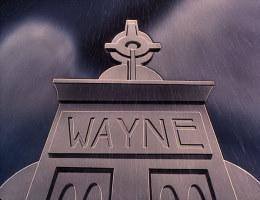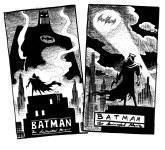Backstage - Interviews - Words from Michael Reaves, Bruce Timm
Presented
below are comments from Michael Reaves
(screenplay) and Bruce Timm (co-producer,
director). Please note that the Bruce Timm
comments come from
Modern Masters: Bruce Timm.
Michael Reaves
 As I recall, B:MOTP was originally to have
been written by Alan solo, but he realized there
was no way he could do it and continue to
produce the show as well. So, once the story was
hashed out, we simply carved it up into chunks.
Alan wrote the first act, roughly --from the
beginning to Buzz Bronski’s graveyard demise.
Marty took the next part, from Valestra’s first
appearance to Andrea ditching Bruce. Paul
carried on from there with the intro of the
Joker (naturally), on up to Reeves (no relation)
being questioned by Bats in the hospital, then
passed to me and I ran for the finish. (I don’t
mean to give the impression that we wrote it
sequentially; we were all working on our parts
simultaneously, to save time.) As I recall, B:MOTP was originally to have
been written by Alan solo, but he realized there
was no way he could do it and continue to
produce the show as well. So, once the story was
hashed out, we simply carved it up into chunks.
Alan wrote the first act, roughly --from the
beginning to Buzz Bronski’s graveyard demise.
Marty took the next part, from Valestra’s first
appearance to Andrea ditching Bruce. Paul
carried on from there with the intro of the
Joker (naturally), on up to Reeves (no relation)
being questioned by Bats in the hospital, then
passed to me and I ran for the finish. (I don’t
mean to give the impression that we wrote it
sequentially; we were all working on our parts
simultaneously, to save time.)
That’s just the broad strokes, however. Once we
had a rough draft we each read over it, going
over it page by page at first singly, then all
together in a room. So we all have dialogue and
scenes salted liberally throughout the script.
WBA was initially dubious when Alan pitched them
a story of unrequited love, with a downer
ending; they’d envisioned something much more
action oriented and upbeat. So they sort of
gulped and waited to see the first draft. They
greenlit it to feature when they read it, which
was a nice moment for all of us. I think it
holds up quite well; in fact, the only part I
still cringe at is the title. I came up with the
original title, which was simply “Masks”. But
they made it much more cartoony. Still, give ‘em
credit -- they didn’t mess with the story. I can
live with a cartoony title.
Bruce Timm
 Modern Masters: Well, let’s go into Mask
of the Phantasm. Originally it was to be a
direct-to-video production— Modern Masters: Well, let’s go into Mask
of the Phantasm. Originally it was to be a
direct-to-video production—
Bruce Timm: For all intents and purpose,
it was. It got theatrical release as
afterthought.
MM: Before you knew it was going to show
in theaters, it was being produced to fit the TV
format. At what point did you actually find out
it would have a theatrical release?
BRUCE: Well, they had been talking about
it as a possibility, and they kept going back
and forth onit. We ultimately said it probably
wasn’t going to happen. There weren’t a lot of
direct-to-videos that got theatrical release.
The Aladdin movie was one of few that
did, but that was Disney. We just thought, “Ah,
there’s no way Warner Bros. is actually going to
release this theatrically. They’re just not into
it to that degree.” Eric Radomski and I were in
Japan going over the storyboard with the
animators in detail, explaining what we wanted
with it, when we got the call from the States
that they were definitely going to release it
theatrically. It was just…oh, man. Because the
storyboard was done and were in that 4:3 TV
format. It was really late in the production
stage—we were handing it out to the
animators—“Now what the hell are we going to
do?” So I sat there with a piece of paper and an
exacto knife and made a little 1.85:1 template
and laid it over the storyboard and said, “Well,
okay, it’s not going to be that difficult.” We
had to go shot by shot, laying that template
over it. “Is the shot going to work? Do we have
to make it wider? Do we have to adjust the frame
up or down?” Most of the shots work without too
much tweaking, but it was a nerve-wracking thing
to have to do at the last minute.
MM: Were you satisfied with the results
as it came across on the big screen?
Bruce: I think we could have done better.
Which is really weird, because we spent a lot of
money on it for the time. We had a much bigger
budget for that show than we did for the regular
TV show, and I don’t think it really shows on
the screen. I think it looks like an episode of
Batman. I don’t think it looks like a
theatrical production. I mean, it’s okay, the
animation’s good—it’s definitely comparable to
the other stuff we were doing at that time. If
TMS had animated it, it would have had a little
bit more finesse, a little bit more polish. It’s
not even so much the money, but the thing was
cranked out really quickly. There was never
enough time to finesse it to the point I would
have been happy with it. And, again, it was
never intended to be theatrical. If we had known
going in that it was going to be a theatrical
movie, we probably would have worked a little
bit harder on it to broaden the scope of it, to
make it a little more elaborate. I don’t know,
it’s all hindsight, but I was never very
satisfied with Mask of the Phantasm. It
was a pretty good attempt, but I’ve always felt
it was lacking in some respects.
[ Back to Backstage ]
|
|
